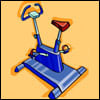When I told my grandmother that I was training for the Wellfleet Road Race, a hilly five-mile loop held annually on the Fourth of July weekend, she made a face like there was stink in the room and said, "I only run when chased." I understand the sentiment. I had held a similar disdain for running most of my life, witnessing the sweaty, heaving runners at end of the road race with confusion and pity. This is your idea of a beach vacation?
But recently I joined them, a new and committed convert to the joy of running, forgoing a lazy morning on the ocean for a heart-pounding jog along the shore. To be one of "them" is a genuine surprise; but the deeper revelation in running is in its surprising power to teach the mind about recovery from depression and anxiety.
I felt better leaving the gym than I had going in, every single timeI'm someone who struggles with her mental health. In the winter of 1993, after a series of life threatening episodes of mania and depression, I was diagnosed with bipolar disorder at the age of seventeen. In the fifteen years that have passed, with the help of lithium, therapy, and other healthy practices, I've led a fulfilling and sane life. But every winter, without fail, I get depressed again. Not the kind of severe and suicidal depression I used to have before I was diagnosed; treatment keeps that at bay. Instead I suffer a milder version, perhaps because the time of year reminds me of traumatic memories, perhaps because the days are so short, or perhaps because it's simply the natural melancholic part of a broader cycle of life. For whatever reason, or combination of reasons, winter brings a certain hopelessness and fatigue, irritability towards other people, and a desire to stay in and dissociate to daytime television with a jar of chocolate spread and a spoon.
This year was different. This year, in January, the idea of being fit enough to run five miles along the coast of Cape Cod by July motivated me enough to join a gym, and the lessons I learned about my body and my mind kept me motivated until race day and after.
My earliest discoveries on the treadmill were dramatic; I found that running created immediate improvements in my mood. I felt better leaving the gym than I had going in, every single time. Running asked me to get out of my head and into my body. I slept better on nights when I had worked out. The toning and weight loss are happy-making, as is the ensuing sense of pride and strength.
More profoundly, running meant movement when I felt stuck. A depressed person often feels like he or she will be in a rut forever. Running teaches otherwise. And with each and every time that the body recovers from being out of breath, the mind learns that getting knocked out isn't forever, that if you can keep breathing, and relax through it, you'll soon be ready to run again. In depression, you forget that you've ever been or could ever be any better. Immersing yourself in the physiological power of recuperation can help your mind remember that a state of depression is not a permanent state.
Finding the right pace in life, regardless of how fast other people seem to be going, can be crucialWhen you're training for a race, you get new concepts about pace. Training has taught me that if I find the right speed, I can build endurance and run for over an hour. If I push too hard, or run with speedy impatience, I may self-sabotage. For people who are going through a tough time, finding the right pace in life, regardless of how fast other people seem to be going, or how far we feel from our goals, can be crucial.
Ultimately, I was surprised how mental running became, how often I used coping techniques that I had learned in therapy to self-coach to keep going. Like many people with depression or anxiety, I often become overwhelmed by feelings or sensations. In training, I've learned to calmly soothe the inner voices urging me to stop running, to remind myself that I'm safe and comfortable, and that an unsafe or uncomfortable feeling could simply pass if I allow it.
Of course, running won't solve the deep seeded issues that cause depression or anxiety; for instance, running doesn't get you a more satisfying job or relationship, and running can't be relied on as a treatment for serious mental illness. But as a companion for life's emotional or psychiatric difficulties, running is a true friend. Over time, it can deliver a new view of self, literally and figuratively, which leads to an improved worldview, too.
The race itself? You want to know how it went? Okay, I'll tell you. I won. Just kidding. I finished. I finished with a smile on my face and a good attitude, ahead of two grossly overweight individuals, and a handful of walkers, but behind ninety percent of the runners, dozens of senior citizens, and another handful of walkers. I'm slow. But I finished in the best shape of my life, admiring my fellow competitors, and with the desire to do better. That's winning enough.
Editor's Note: In Chassidic thought, there is a concept called Ratzo V'Shov, literally to "run and return," which beautifully parallels the theme of Lizzie's article. One way of understanding this concept, is that running is what keeps us going, brings us higher, and makes us achieve, move and grow. And the return aspect is then integrating that inspiration into our life when we are not going so fast. It is running (physically, emotionally or spiritually) for the sake of integration as opposed to running in order to escape.








Join the Discussion